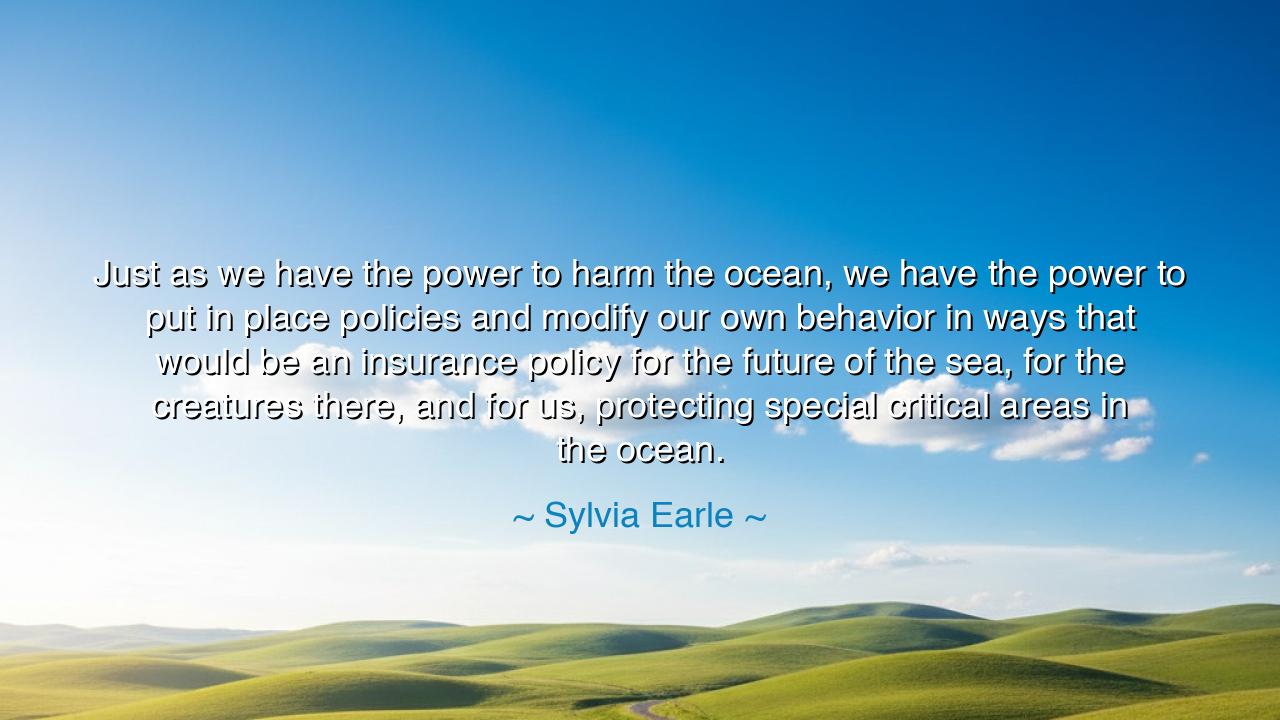
Just as we have the power to harm the ocean, we have the power to
Just as we have the power to harm the ocean, we have the power to put in place policies and modify our own behavior in ways that would be an insurance policy for the future of the sea, for the creatures there, and for us, protecting special critical areas in the ocean.






In the depths of human history, there has always been a deep connection between humankind and the natural world—one of both dominion and responsibility. Sylvia Earle’s words, “Just as we have the power to harm the ocean, we have the power to put in place policies and modify our own behavior in ways that would be an insurance policy for the future of the sea, for the creatures there, and for us, protecting special critical areas in the ocean,” serve as a powerful reminder of the great responsibility that accompanies power. Earle’s message is a call to action, one that urges us to reflect on our impact on the world around us, particularly the ocean—a vast and ancient force that sustains life and, in many ways, shapes our own existence. Just as we have the ability to destroy and exploit, so too do we have the capacity to protect, preserve, and nurture the natural world for future generations.
In the ancient Greek world, the ocean was more than a body of water; it was the domain of the gods, the realm of Poseidon, the god of the sea, whose moods could either sustain or destroy civilizations. The ancient Greeks understood that the natural world was both a source of life and a force of great power that should be respected and honored. Just as they built temples and sacrifices in honor of Poseidon, acknowledging the sea’s immense power and importance, we must similarly acknowledge the vital role the ocean plays in the balance of life on Earth. Earle’s call to protect critical areas of the ocean is a modern extension of this ancient understanding: that humanity must not only respect the sea but actively engage in its preservation.
Consider the Romans, who were masters of engineering and expansion, yet also understood the significance of conservation and the careful management of resources. The Roman aqueducts are still a testament to their ability to harmonize with nature, channeling the forces of water to serve their needs while understanding its profound impact on their cities and lives. The Romans did not take nature for granted; they recognized that their civilization depended on the responsible use of the resources around them. Earle’s message reflects this same wisdom: just as the Romans worked with water, not against it, we must learn to live in harmony with the ocean, acknowledging that our actions today will have a lasting effect on the world tomorrow.
This message of responsibility is echoed throughout history. In medieval times, the survival of fishing communities depended on maintaining the balance between harvest and renewal. The Cod Wars between Britain and Iceland in the 20th century were sparked by overfishing, a violation of the understanding that the sea’s resources were finite and required protection. The struggle for marine conservation has always been a battle between exploitation and sustainability, a challenge that remains pressing to this day. Earle’s call to implement policies and modify behaviors in a way that preserves the ocean echoes the wisdom of past generations who understood that to protect our world, we must be mindful and accountable in how we interact with its natural forces.
The story of Rachel Carson, the environmentalist whose work on the dangers of pesticides led to the birth of the modern environmental movement, offers another example of how one individual can transform society’s relationship with nature. Her book, Silent Spring, not only exposed the destructive impact of pesticides on the environment but also called for a shift in consciousness—a new way of thinking about our relationship with the natural world. Just as Carson’s work led to policy changes that protected land and wildlife, Earle’s plea for the ocean is an urgent call to protect the marine environment from the effects of human activity. Both figures embody the power of awareness and the role that each of us plays in shaping the future of the planet.
The lesson from Earle’s reflection is one of balance and responsibility. We must recognize the immense power we hold to either harm or protect the natural world around us. The ocean, like the land, is not a resource to be consumed but a living system that requires our respect and care. The future of the sea, of the creatures that dwell within it, and of ourselves depends on the decisions we make today. We must be proactive in our efforts to protect these critical areas, ensuring that our actions align with the goal of creating a sustainable world for future generations.
In our own lives, we must embrace the understanding that conservation is not just the task of a few, but the responsibility of us all. Just as the ancient civilizations sought to live in harmony with the natural world, so too must we strive to reduce our impact, to preserve the delicate ecosystems that sustain life. Whether through individual actions, policy advocacy, or community involvement, we all have the power to contribute to a future where the ocean is not only a source of life but a testament to our collective wisdom and care for the planet. Let us, like Poseidon, honor the ocean and recognize that its future lies in our hands—shaped by the choices we make today.






AAdministratorAdministrator
Welcome, honored guests. Please leave a comment, we will respond soon